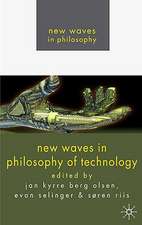On Knowing--The Natural Sciences
Autor Richard P. McKeon Editat de David B. Owen, Zahava K. McKeonen Limba Engleză Paperback – 30 sep 1994
Well before the current age of discourse, deconstruction, and multiculturalism, Richard McKeon propounded a philosophy of pluralism showing how "facts" and "values" are dependent on diverse ways of reading texts. This book is a transcription of an entire course, including both lectures and student discussions, taught by McKeon. As such, it provides an exciting introduction to McKeon's conception of pluralism, a central aspect of neo-Pragmatism, while demonstrating how pluralism works in a classroom setting.
In his lectures, McKeon outlines the entire history of Western thinking on the sciences. Treating the central concepts of motion, space, time, and cause, he traces modern intellectual debates back to the ancient Greeks, notably Plato, Aristotle, Democritus, and the Sophists. As he brings the story of Western science up to the twentieth century, he uses his fabled semantic schema (reproduced here for the first time) to uncover new ideas and observations about cosmology, mechanics, dynamics, and other aspects of physical science.
Illustrating the broad historical sweep of the lectures are a series of discussions which give detail to the course's intellectual framework. These discussions of Plato, Aristotle, Galileo, Newton, and Maxwell are perhaps the first published rendition of a philosopher in literal dialogue with his students. Led by McKeon's pointed questioning, the discussions reveal the difficulties and possibilities of learning to engage in serious intellectual communication.
In his lectures, McKeon outlines the entire history of Western thinking on the sciences. Treating the central concepts of motion, space, time, and cause, he traces modern intellectual debates back to the ancient Greeks, notably Plato, Aristotle, Democritus, and the Sophists. As he brings the story of Western science up to the twentieth century, he uses his fabled semantic schema (reproduced here for the first time) to uncover new ideas and observations about cosmology, mechanics, dynamics, and other aspects of physical science.
Illustrating the broad historical sweep of the lectures are a series of discussions which give detail to the course's intellectual framework. These discussions of Plato, Aristotle, Galileo, Newton, and Maxwell are perhaps the first published rendition of a philosopher in literal dialogue with his students. Led by McKeon's pointed questioning, the discussions reveal the difficulties and possibilities of learning to engage in serious intellectual communication.
Preț: 325.05 lei
Nou
Puncte Express: 488
Preț estimativ în valută:
62.22€ • 67.61$ • 52.30£
62.22€ • 67.61$ • 52.30£
Carte tipărită la comandă
Livrare economică 22 aprilie-06 mai
Preluare comenzi: 021 569.72.76
Specificații
ISBN-13: 9780226560274
ISBN-10: 0226560279
Pagini: 420
Ilustrații: 29 line drawings, 13 tables
Dimensiuni: 152 x 229 x 28 mm
Greutate: 0.58 kg
Ediția:1
Editura: University of Chicago Press
Colecția University of Chicago Press
ISBN-10: 0226560279
Pagini: 420
Ilustrații: 29 line drawings, 13 tables
Dimensiuni: 152 x 229 x 28 mm
Greutate: 0.58 kg
Ediția:1
Editura: University of Chicago Press
Colecția University of Chicago Press
Cuprins
List of Figures and Tables
Foreword
1: An Introduction to Philosophic Problems
2: Philosophic Problems in the Natural Sciences
3: Motion: Method
4: Motion: Method (Part 2) and Principle
5: Motion: Interpretation
6: Motion: Selection
7: Motion: Selection (Part 2)
8: Space: Time: Method, Interpretation, and Principle
9: Time: Method, Interpretation, and Principle
10: Summary: Interpretation, Method, and Principle
Appendix A: Class Schedule
Appendix B: Selected Lecture Notes on Necessity, Probability, and Nature
Appendix C: Selected Lecture Notes on Democritus and the Sophists
Appendix D: Selected Lecture Notes on Cause
Appendix E: Complete Lecture Notes for Lecture 10
Appendix F: Discussion Notes For Einstein
Appendix G: Final Examinations
Appendix H: Schema of Philosophic Semantics
Notes
Index
Foreword
1: An Introduction to Philosophic Problems
2: Philosophic Problems in the Natural Sciences
3: Motion: Method
4: Motion: Method (Part 2) and Principle
5: Motion: Interpretation
6: Motion: Selection
7: Motion: Selection (Part 2)
8: Space: Time: Method, Interpretation, and Principle
9: Time: Method, Interpretation, and Principle
10: Summary: Interpretation, Method, and Principle
Appendix A: Class Schedule
Appendix B: Selected Lecture Notes on Necessity, Probability, and Nature
Appendix C: Selected Lecture Notes on Democritus and the Sophists
Appendix D: Selected Lecture Notes on Cause
Appendix E: Complete Lecture Notes for Lecture 10
Appendix F: Discussion Notes For Einstein
Appendix G: Final Examinations
Appendix H: Schema of Philosophic Semantics
Notes
Index














